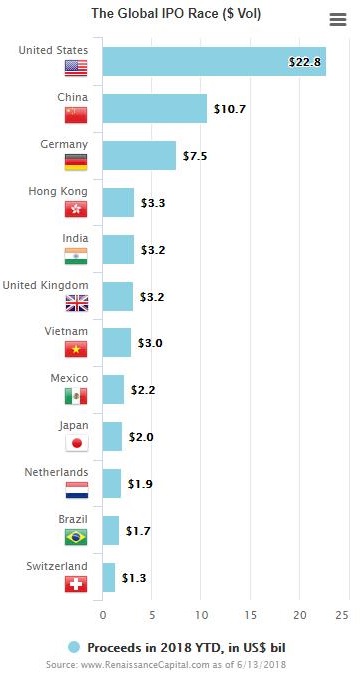
The Hong Kong Stock Exchange has become a hot spot for attracting the initial public offerings of some of the largest companies in the world.
While U.S. markets await the IPOs of Uber and Airbnb, three Chinese companies that rank among the world’s 20 largest internet firms are expected to list this year in $5 billion-plus deals in Hong Kong: Xiaomi, known as the Apple of China; Meituan-Dianping, operator of websites similar to Groupon and Yelp in China; and Didi Chuxing, which bought Uber’s China business.
Chinese state-owned enterprises China Tower, a mobile phone infrastructure company, and Sinopec Marketing, a spin-off of China Petroleum & Chemical’s retail fuel business, are also expected to each hold $5 billion-plus listings in Hong Kong this year, according to Renaissance Capital.

Hong Kong is “perfectly positioned to provide effectively an access point” to one of the fastest growing regions of the world, said Andy Nybo, director at Burton-Taylor International Consulting, which does financial markets research. He pointed out the former British colony has a developed economy and financial market, and provides international investors a link to mainland Chinese markets through the “stock connect” program.
Last year, Hong Kong Exchanges and Clearing‘s revenue jumped more than 18 percent, according to a Burton-Taylor report. That’s greater than 6.6 percent growth in Nasdaq revenue and 2.9 percent growth for New York Stock Exchange owner ICE, the study showed.
“In general there is a huge battle for capital,” said Sebastien Lieblich, managing director and global head of equity solutions at MSCI.
“There is clearly an incentive for the markets, the regulators, equity markets to build up their exchanges,” he said. “Markets [will] become more and more globalized. Emerging markets recognize they can attract that money.”
Indexing giant MSCI announced Wednesday that it would include Saudi Arabia in its benchmark emerging markets index, tracked by more than $1.9 trillion in global assets. It also reclassified Argentina to emerging market status. Last year, MSCI approved the inclusion of some of China’s mainland-traded A shares. Part of those shares were officially added about three weeks ago.
In greater China, new policies could also help increase capital inflows.
The Hong Kong Stock Exchange implemented new rules in April allowing biotech companies without revenue or profit to apply for public listings. Beijing is also launching a “China Depositary Receipt” program that will allow China’s tech giants, listed in Hong Kong or in the U.S., to have a dual share offering in the mainland.
That said, U.S. dominance in global IPOs isn’t going away. It is by far the first in terms of number of public offerings and U.S.-dollar proceeds year-to-date, according to Renaissance Capital data as of June 13.
More U.S. listings are coming. Online survey company SurveyMonkey said Monday it confidentially registered for an IPO through its parent SVMK. Other public offerings expected this year include speaker systems company Sonos, personal loans firm SoFi, home improvement services platform Houzz and office space start-up WeWork, according to Kathleen Smith, principal at Renaissance Capital and manager of IPO ETFs.
In addition, Chinese companies still often view a New York listing as a status symbol that helps them gain brand recognition among international investors. Ten of 80 U.S. public offerings this year through June 13 were Chinese companies, Smith said.
“We have been the beneficiary of the delayed growth of these [Chinese] exchanges,” she said. But Hong Kong is shifting away from listings of state-owned enterprise to high-growth tech companies, and mainland China’s markets are slowly maturing.
Down the road, Smith said, “Hong Kong and China together could end up being the largest issuing market for IPOs.”
Source: CNBC